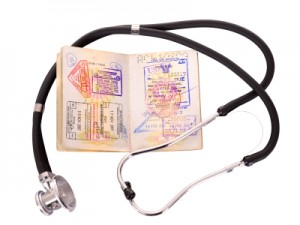Can you imagine traveling to a foreign country for a little liposuction, a tummy tuck, major heart surgery, cutting-edge cancer treatments, or even just a comprehensive physical? If not, then you have never considered medical tourism. This growing practice is happening all over the world. Even here in the U.S., foreign travelers arrive for medical procedures. As the trend grows with leaps and bounds, countries throughout the world are jumping to get a piece of the economic pie. Between the continued spikes in healthcare costs and the multi-millionaire insurance CEOs who figured out they can get fatter wallets by making drastic cuts in what they will cover, it may even become a necessity.
 What is Medical Tourism?
What is Medical Tourism?
Medical tourism is a phrase that was coined recently to name the phenomenon of people traveling outside of their home country to receive medical care abroad. The term has a negative connotation for many. People often think of medical tourism as a woman going overseas for cheap plastic surgery and coming home with a lopsided face or a botched breast augmentation. The truth is that medical tourism is a broad practice involving some of the best doctors and hospitals in the world, but of course some shady ones as well.
What Happens When The Government Becomes Your Doctor…
Why Go Abroad for Health Care?
There are several reasons why people choose to go overseas in search of medical care. The overwhelmingly prominent reason is the low cost. In many countries outside of the U.S., Canada, and Western Europe, medical care is significantly less expensive. Many people wanting elective surgery that is not covered by their insurance, mostly cosmetic procedures, can go abroad and pay half the cost they would pay in the U.S. Others who have no health insurance, but desperately need medical treatment may choose to go abroad to save money, while those who do have insurance but with very high deductibles may do the same.
Another reason for choosing medical care abroad is the availability of certain procedures. If there is a wait for necessary medical treatment that you desperately need, you may decide to see what other options you have abroad. In other cases, certain procedures simply don’t exist in the U.S. Another country’s doctors and surgeons may be working on new and innovative procedures that cannot be found anywhere else. Whatever the reasons, the fact is that medical tourism is a booming industry. From the U.S. alone, nearly one million people per year travel abroad for health care.
Where is Everyone Going?
There are at least fifty countries worldwide that recognize medical tourism as an industry. The most popular destinations in Asia are India, China, Israel, Jordan, Malaysia, Singapore, Philippines, Turkey, and South Korea. In Europe, medical tourists are going to Spain, Russia, Portugal, Poland, Lithuania, the Czech Republic, and Belgium. In the Americas, Argentina, Costa Rica, Ecuador, Colombia, Mexico, and Brazil are popular. In the rest of the world, tourists go to Cuba, Jamaica, South Africa, and Tunisia for medical care.
How Does this Work?
Typically, someone seeking medical care abroad will start with a medical tourism provider. There are many companies that are set up to help the tourist find the right country, hospital, and physician to meet their specific needs. For example, at one site, you simply pick the type of procedure you want and hit search. After inputting your information, you are given a list of countries and facilities that can accommodate you. Before actually going through with a medical procedure, of course, there are more hoops to jump through. You may need to provide your medical history, records, diagnosis, and other medical documents. Eventually, you sign consent agreements, receive a recommendation for a medical visa, and then travel to your destination for treatment.
Depending on the seriousness of the medical treatment and the amount of recuperation time required, many participants in medical tourism truly make a vacation of the experience. Patients often use time before and after their procedures to see the country and to have a relaxing holiday.
What Are the Risks Involved with Medical Tourism?
Medical tourism has been going on for decades at least. For many years, wealthy people from countries with poor medical resources traveled to the U.S., Canada, the UK, France, and other locations with top-notch health care to pay for the best services. Today, medical tourism usually refers to the opposite: people from the western nations traveling to other countries for lower-cost medical care. In the early days of this practice, going abroad presented a risk. As a traveler with no medical expertise, it is difficult, if not impossible, for a patient to determine whether or not a hospital and doctor are experienced, well trained, and able to provide high-quality care.
With the rise of medical tourism providers, the risk is diminished. If you choose to try out a medical tourism trip without the assistance of a knowledgeable service to guide you, there is a risk that you will end up at a facility that will not be well equipped for your care. It is not impossible to pick your own facility and doctor, but to do it right, research is important. One place to start is the Joint Commission International, an organization that gives accreditation health care facilities.
Some take a more negative view of this accreditation and the packaging of medical tourism. They call it medical outsourcing and claim that insurance companies and employers aim to cut costs by encouraging patients to go oversees to these accredited institutions where care is much cheaper. Some of the accredited facilities may even receive reimbursement from Medicare or private insurance groups. This is new and uncharted territory, especially in the case of malpractice. If a patient feels they have received poor care at a foreign hospital, malpractice suits may be difficult to bring against the physician. The fact that litigation is limited in some countries is one of the reasons medical care may be much cheaper than in the U.S.
Another risk to consider as a medical tourist is the possibility of infectious disease. If you are an American traveling to Southeast Asia, for instance, you will not have the same immunity to certain illnesses that the locals do. Your risk for contracting a disease is a real concern. Bacterial infections may be a rising problem with the increase in medical tourism. With the growing number of people traveling to hospitals and other medical facilities throughout the world, the chances of spreading bacterial infections is much greater than ever before. Especially scary is the possible spread of so called superbugs. These are bacteria that do not respond to antibiotics. Such a superbug has already emerged in one of medical tourism’s top destinations: India. A bacterium called NDM-1 was identified in New Delhi in 2009 and several cases have been identified since then in India, Singapore, Europe, Australia, the U.S, the UK, Japan, and Hong Kong. The infections were identified as originating in medical tourists who came to India for treatment.
Post-operative care is an important part of any medical treatment. In some countries and in some facilities, this may be lacking. Even if the quality of the surgery itself is very high, the care afterwards may not be sufficient and the patient can risk getting infections or healing poorly. If the post-operative care is good, but short in duration, there can be problems later. It is wise to plan time to recuperate in the facility or very close by if you are planning an overseas procedure. You give yourself the chance to recover fully this way and the opportunity to consult with the attending physician if any problems arise.
Medical tourism is a natural consequence of the rising costs of health care. There are many benefits for those who choose to travel abroad for medical treatments and surgery, but there are very serious risks as well. If you are considering such travel, take the time to learn about the possible consequences and to find the best possible facility and physicians to care for you.
©2012 Off the Grid News











